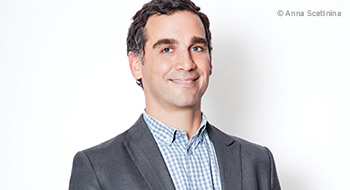

Cedric Orvoine, vice-president of HR and communications, Ubisoft
>> Describe your open-concept workspace.
We have open space in our office, but people have desks assigned to them. We have pretty big areas that just have no walls [and no cubicles]. We have fairly massive teams that can go up to 300 or 400 people who work on one single project, so there needs to be some cohesion in how the team is organized—not only on the management side but also on the layout [side].
We work on pretty high-end technology, so we don’t work with laptops. Our game developers, most of the time, have three different monitors on their desks, so it would not be possible to work in a totally open space [where you come in with your laptop and sit anywhere]. There’s one closed office in the whole building, and it’s the CEO’s. There’s [a] necessity for us to have working floors that are open and facilitate circulation, exchange, sharing, discussion and standing meetings.
>> What would you say to critics of the open-concept work space who see it as distracting?
I truly believe that an open-space work environment is not necessarily the one-size-fits-all answer for every organization. A lot of the people that work for us have always worked in these types of environment. There are different ways of making sure that people can get their focus. Everybody has a set of headphones. Everybody finds ways to make it clear that when they need to concentrate and focus, they can do it. Every manager is allowed to set no-meeting hours. We try to make sure that people can find the comfort level they need. From our point of view, the advantages are way greater than the [drawbacks].
>> What advice would you give to companies considering an open-concept work environment?
I think it’s very important to look beyond the cool factor that is attached to the concept of open space. It’s important for any organization that wants to make the transition to make sure it really analyzes the whole situation and clearly evaluates the pros and cons.
>> How is technology affecting health and pension benefits?
Everything is supported by online tools. In real time, you can have access to all of your information. But I think what we have to be careful about is the exchange with a human, [which] is still very important. An organization always has to make sure there’s that human contact—that person you can go up to and ask your questions. Because a lot of the benefits are related to human situations: they’re related to your family, to your own personal wealth and health.
>> Are you a gamer? Which games do you enjoy?
I’ve been working in the video game industry for more than 15 years now, so by default that makes me a video gamer. I’m not a hard-core gamer, [though]. In the past few months, I’ve been playing a lot of Clash of Clans on my iPhone. On my PC, I play Hearthstone. On my console, lately, I’ve been playing NHL 15. [One night,] I played NHL 15 until 1 a.m. I was really into the game…I was probably screaming at the other team. And I woke up my girlfriend. She came into the living room and she was like, ‘Okay, I think that’s enough.’
Yaldaz Sadakova is associate editor of Benefits Canada.
Get a PDF of this article.
